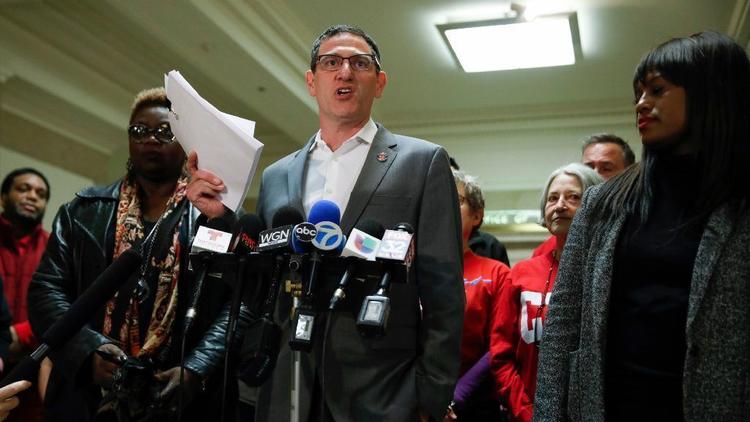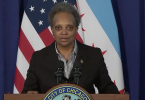‘Where will the money come from? Rich people,’ Chicago Teachers Union says as it seeks increased pay, staffing in contract
Chicago Teachers Union members lodged their first demands for a new contract Tuesday — including pay hikes and a host of topics state law bars the labor group from striking over — months before negotiations will likely accelerate with a new administration.
The CTU’s contract expires June 30. Chicago voters might not elect the city’s new mayor until April if the election goes to a runoff. Even the leadership ranks of Chicago Public Schools could change after the winner takes office.
While Los Angeles teachers stage a massive strike and controversy envelops the CTU’s chosen candidate for mayor, union President Jesse Sharkey and top deputies delivered a sheaf of written demands to lame-duck Mayor Rahm Emanuel’s office at City Hall.
CTU officials said their proposals include a 5 percent pay raise for union members. The union is also demanding maximum classroom sizes that range between 20 and 24 students in early grades, counselors for every 250 students, and librarians and nurses staffed at every school.
“We intend to bargain hard,” Sharkey said. “We intend to bring both our allies and our members into a fight for the schools that our students deserve. We’re going to support a new mayor to the extent they do the right thing by our schools, and we’re going to act independently of them and fight them to the extent they don’t.”
The union also wants the district to hire more teaching assistants for some early grade classrooms, plus secure additional pay raises for the category of employees that includes those aides and school clerks. The CTU is also calling on CPS to boost the district’s ranks of African-American and Latino job applicants and halt its outsourcing of school custodians from private contractors.
A union spokeswoman said the CTU had not fully tabulated the cost of its demands, but labor group leaders acknowledged its proposals would require a significant amount of additional spending.
“Where will the money come from? Rich people,” CTU Vice President Stacy Davis Gates said Tuesday, as she repeated the union’s call for Illinois to tax its wealthiest residents at higher rates and pointed to revenue-generating ideas that need support from Democratic Gov. J.B. Pritzker.
“We have a governor who has committed to legalizing recreational marijuana and putting a tax on it, we can take that as well,” Davis Gates said. “They are also talking about sports betting. We can take that. They’re talking about opening a new casino here in the city of Chicago. We can take that.”
CPS would not discuss its potential counterproposal to the union.
“CPS is led by two lifelong Chicago educators who understand the supports our teachers need to be successful, and we look forward to beginning productive conversations to work toward a contract that honors the contributions of our educators and supports the best interests of Chicago students and families,” district spokesman Michael Passman said in a statement.
By publicizing some of its contract demands well before more substantive bargaining sessions, the union carried out a strategy honed under former President Karen Lewis to establish teachers as a force for social and racial justice pitted against a city government seen as an ally of business elites.
CTU is also relying on union polling that shows broad public support for the labor group as it carries out its own contribution to a movement that saw teacher strikes in several states last year, including the nation’s first charter school strike.
At the same time, CTU’s proposals to help repair an intensely segregated school system collide with problems including limited funds and a statewide teacher shortage that’s already contributed to a raft of unfilled positions inside CPS.
The district has used money from new taxes and state aid to manage a still-woefully underfunded pension system but faces ongoing fiscal stress and a lack of public details on how lawmakers will pump billions of new dollars into an overhauled state education funding formula.
Two-thirds of this year’s roughly $6 billion CPS budget is already devoted to educators’ salary and benefits, according to the district.
There’s also this: While CTU and CPS may negotiate over many of the subjects the union identified as priorities Tuesday, state law largely prohibits city public school educators from striking over those issues.
Contract talks between the union and CPS can cover class sizes, outsourcing, staffing, layoffs and the length of the school year. But Illinois law grants CPS broad authority to implement its own policies on those issues, and bars CTU from striking over them. That may put teacher compensation at the center of contract talks.
The dynamic of those negotiations could hinge on who is elected mayor. The CTU has endorsed Cook County Board President Toni Preckwinkle, and steadily criticized political veterans Bill Daley and Gery Chico.
CTU officials did not discuss the possibility of a strike during a news conference staged outside Emanuel’s office. A long list of events needs to occur in the coming months before a work stoppage becomes a real possibility, starting with the outcome of the coming city election.
“There’s no two ways around it,” Sharkey told the Tribune. “The way it currently sits in Chicago, the mayor of the city has control over the schools.
“So the current mayor needs to bargain a contract in good faith, but at the end of the day, our contract doesn’t actually expire until it’s under the next mayor’s watch. So the actual job of carrying this thing across the finish line is going to go to the next mayor,” he said.
jjperez@chicagotribune.com
Twitter @PerezJr







